By Patricia Caso/June 6, 2013
Photos from Women of Means Organization
I was intrigued by a CBS Evening News report on Dr. Roseanna Means. In 1999, she founded the Women of Means organization in Boston, Massachusetts, a non-profit that helps homeless women and children. Dr. Means and her group now work in seven shelters and often right on the streets logging in between 8-10,000 patient “visits” each year.
“I didn’t insist they give me their real names. I don’t wear fancy clothes or a white coat. They call me Dr. Roseanna. I am always there on the same day, same time, predictable, comfortable and very approachable.” Dr. Roseanna Means
Perhaps because she has experienced double knee replacement, melanoma, divorce and a new marriage, Dr. Means can more easily diagnose these women. As I learned, this selfless, inspiring doctor and her team do much more than practice medicine…
EYE: What do you see when you work with homeless women?
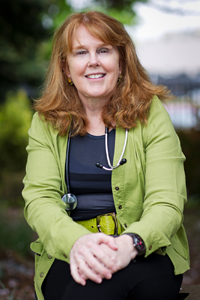 DR. MEANS: I see courage. These women lose all their material possessions, even their children and their relationships. There are a myriad of indignities that happen when you are poor, when your circumstances change, when you can’t think straight, speak up or advocate for yourself. Yet, when women lose all this, I am always so impressed by their perseverance, how they endure.
DR. MEANS: I see courage. These women lose all their material possessions, even their children and their relationships. There are a myriad of indignities that happen when you are poor, when your circumstances change, when you can’t think straight, speak up or advocate for yourself. Yet, when women lose all this, I am always so impressed by their perseverance, how they endure.
I’ve seen these women just beaten down by the system and the social situation, and yet, they come to the shelter ready to help out their friends, remember somebody’s birthday. They will tell a good joke. They put their hand on mine when I am having a tough day. We have no idea what it’s like for these women to go through what they go through.
Yet, their ability to transcend their situation, embrace the human condition, be able to give back and join humanity is quite remarkable under the circumstances. I just LOVE these women!
“The majority of these women have bad luck more than they have mental illness. They’ve been abandoned by a mate, or divorced or their husbands died and they lost everything.”
EYE: What myths of homelessness have you found?
DR. MEANS: Stereotypes like homeless women are all bag ladies, lazy, talking to themselves, ranting and raving on the streets, etc. are really quite rare. The majority of these women have bad luck more than they have mental illness. They’ve been abandoned by a mate, or divorced or their husbands died and they lost everything.
Some raised their kids and never got a job. Or, they had a part-time job on the side with no benefits, and then a horrendous medical calamity came along and they could not pay their bills. Some of these women are just remarkable people, not bad people at all; they did not let things slide.
Things happen to them, time runs out and there they are, living on the streets. Importantly, many of the women that we take care of are not homeless anymore. These women move on. (Below is the CBS News Video piece on Dr. Means.)
EYE: How do you gain the trust of these women?
DR. MEANS: I listen a lot. I pass no judgment. I try and find out what I can do to help. I meet them where they are. In the beginning, I found that going in as a goody-goody with my blood pressure cuff and stethoscope, I wasn’t able to reach women who had been assaulted in the past.
If you are working with a woman who has been assaulted or held down and you put a blood pressure cuff on their arm and pump it, it feels like bondage to them, which is very, very scary to someone who has been physically traumatized. So I learned podiatry.
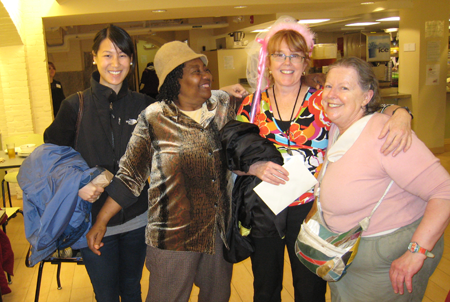
I offered my services to women who didn’t want me to get too physically close to them. I would sit on the floor, put their feet in my lap, cut toe nails, shave callouses, give them a foot massage and keep a conversation going. Sooner or later they would open up. It wasn’t so scary for them.
I didn’t insist that they give me their real names. I don’t wear fancy clothes or a white coat. They call me Dr. Roseanna. I am always there on the same day, same time, predictable, comfortable and very approachable.
“When I got past a dark time in my life that involved divorce and double knee replacement, I decided to give myself a present by going to Nepal to work with kids in orphanages and do some climbing. That’s who I am.”
EYE: Is social justice something you always aspired to?
DR. MEANS: I grew up in the Boston area and my mother encouraged me to give back at an early age. I am one of these children of the 60’s who were influenced by the Kennedys and very much tied to the saying: “To whom much is given, much is expected.” No matter what your position in life is, you should always think about giving back!
At 13-years-old I started as a Candy Striper. In high school, I spent a summer in Appalachia helping in the coal mining community. When I got past a dark time in my life that involved divorce and double knee replacement, I decided to give myself a present by going to Nepal to work with kids in orphanages and do some climbing. That’s who I am.
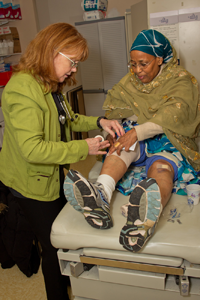 EYE: What prompted you to take action and start Women of Means?
EYE: What prompted you to take action and start Women of Means?
DR. MEANS: I found that homeless women were not coming into the government’s homeless clinic for a variety of reasons. I became aware that we have 75-year-old women sleeping on the streets of Boston in the wintertime. Little kids who have an ear infection or a tummy ache were staying in a hotel room or in a family shelter literally for years on end. I thought this is just outrageous.
This is not something we should accept as the wallpaper of our society. So I decided to do something with absolutely zero skill other than my own innate talent, skills and training. I didn’t know how to write a grant, to ask for money, Labor laws, hire people, etc. Over the last 15 years, I’ve learned a lot by doing, trial and error, and I’ve been enormously blessed with amazing workers. Many doctors who volunteer for a year have stayed 5 and 10 years.
They love giving back and the lack of red tape for themselves, as well. We are on a shoestring budget so unfortunately, pay our nurses badly, no benefits. The nurses always work longer hours, taking some of the women to the hospital ER or to appointments, a lot of extra things because they love these ladies.
“I returned from Cambodia with the decision that I needed to do something that would make a mark in people’s lives.”
EYE: Is there a pivotal moment for your decision to make this work your mission?
DR. MEANS: I was a medical resident at Brigham and Women’s Hospital when I took three months off to work at the Cambodian border with the refugees. On arrival, I told them I didn’t know their language, cultural beliefs, or experienced what they’d been through, genocide.
But, I was there to do what I could to help. That was a very powerful lesson for me as a very young impressionable doctor. I had gone to MIT, then Medical School and was lined up to be a cardiologist, a lucrative career. I returned from Cambodia with the decision that I needed to do something that would make a mark in people’s lives.
I saw the Cambodian people, who had been through a nightmare, and there they were singing, teaching their children the cultural dances, how to make baskets and the language. I felt really privileged to witness that enormous resiliency. I was able to take that in and incorporate it into a way of life, a way of professionally dealing with people for the next three decades.
EYE: Switching gears, why are you are climbing Mt. Kilimanjaro this month? You must be a very capable athlete.
DR.MEANS: Either that, or foolhardy. I was not athletic until college where I rowed crew. When I got my knees replaced, I had to learn how to walk and climb again. Kilimanjaro was one of those mountains I always wanted to climb. One day I was talking to someone and said without thinking, “Being homeless is harder than people realize. There is a mountain of obstacles to overcome just to keep going.”
And then it clicked—that I was facing a real life mountain only once, and these women face a mountain every day. I thought, “If they can do that, I should take strength from them and get myself to the top of Mt. Kilimanjaro to honor the struggles they are enduring day after day.” I asked our supporters to join me in solidarity on this climb by donating to Women of Means to help us keep our programs going.
“Sometimes it feels like I am at the base of a 20,000 foot mountain and I don’t even know where to put my first step.”
EYE: You’ve added a stop to your trip?
DR. MEANS: Yes. I will head to Kenya first to reunite Rodah, whom I met in 1999, with her family. She and her husband are too poor to pay their way home. Rodah came to the U.S. for a hip replacement. She and her husband expected to get their green cards after that. However, some unsavory people took advantage of Rodah and Tom. Now she’s 85 and he’s 90.
They are cognitively declining and they’ve both had cancer. With no money, they had been living on the streets, until local agencies placed them a tiny apartment. Rodah still panhandles for spare change. They are stuck in this purgatory unless something comes along to change the trajectory.
That something was me. I decided, with my own private funds and other private donations, to take Rodah and Tom home to their native country to an apartment so their grown children can take care of them.
I can teach their children how to take their vital signs. I’ll bring the medicines and medical records. Then, on to Mt. Kilimanjaro!
“It’s not about me, it’s about who the women are. There, but for the grace of God, go any of us.”
EYE: What is your daily life like?
DR.MEANS: My life is a balance of different competing interests. My full-time job is running Women of Means, basically their chief cook and bottle washer. My “half-time”job is being the primary care physician for a group of patients at the Brigham and Women’s Hospital, where I’ve been on the Medical Staff for 32 years.
Then I have my three grown sons with whom I try to meet on a regular basis. And, not the least is my husband, my second husband. We got married last year. I wake up between 4:30 and 5 am and don’t get to bed before 10 pm.
(Below is the CNN Person of the Year Nominee Video)
EYE: Do you ever feel like your commitments are too big?
DR.MEANS: I have moments when I wonder, “What the heck am I doing?” Sometimes it feels like I am at the base of a 20,000 foot mountain, and I don’t even know where to put my first step. Yet, I am surrounded by so many people who are on the same page as I am, in terms of the social justice of this. This is why Women of Means is very possible and important.
EYE: You were a 2011 CNN Hero featured on network news and print articles. What do you want from all this media attention?
DR.MEANS: It’s not about me, it’s about who the women are. There, but for the grace of God, go any of us. Hopefully, awareness will bring in donations, making Women of Means self-sustaining as well. We have no government money or a fee-for-service model.
We are based on volunteerism. Literally, we change lives, save lives and give the women the MEANS to move forward with their lives.
EYE: You must know you are an inspiration to so many. Is there anyone who has inspired you?
DR. MEANS: Yes, one of my first patients, Cheryl. I met her 20 years ago when she was homeless and helped get her housing. At that point I diagnosed her ovarian cancer. She backed out of surgery three times because she was so scared. She then got breast cancer, but survived.
She’s taught me a lot about homelessness, human dignity, what it is like to be in the street and how the system beats you down. Her resiliency really inspired me. Whenever I’ve had my dark moments and I’ve thought, “you have to be crazy to be doing all this with the skills you have,” I would think of Cheryl.
I cannot let her down. She’s been through so much. She’s taught me so much. She’s been my mentor. She’s shown me what it’s like for these women and I have to do it, keep doing it, for her.
EYE: Thank you, Dr. Means, for this inspiring look into your remarkable life. TWE looks forward to following up with you after you settle Rodah and Tom, establish your new Medical Home Without Walls program and come back from your 14-day Mt. Kilimanjaro climb.
UPDATE July 11, 2013–We just received this photo from Dr. Means who has returned from her trip to Kenya. Here she is with Rodah and Tom, finally reunited with their family. Dr. Means told us that this reunion would stay with her forever as one of her most cherished memories. Thanks so much for sharing this special occasion!
To find out more about Dr. Means and her non-profit, check out Women of Means and follow them on facebook.
###
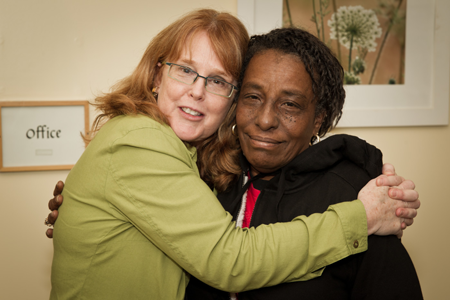
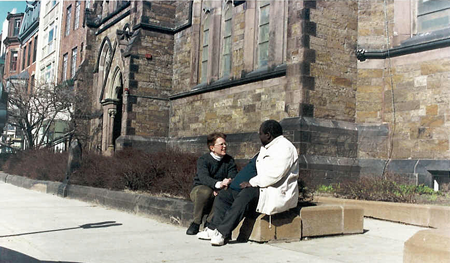
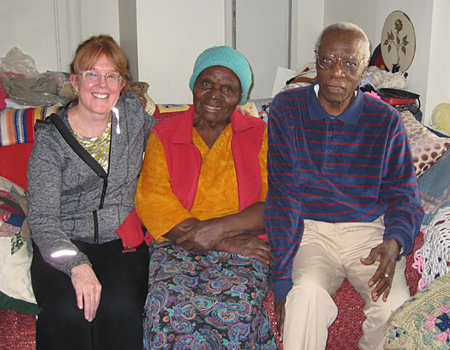
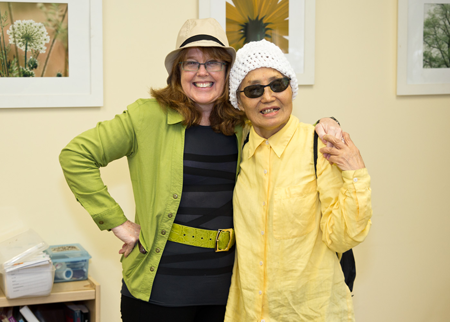
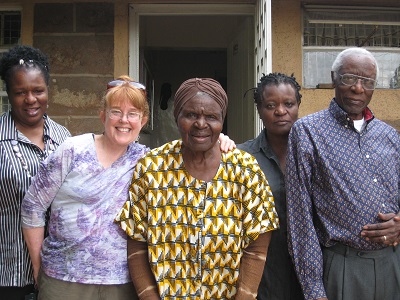



Leave a Reply